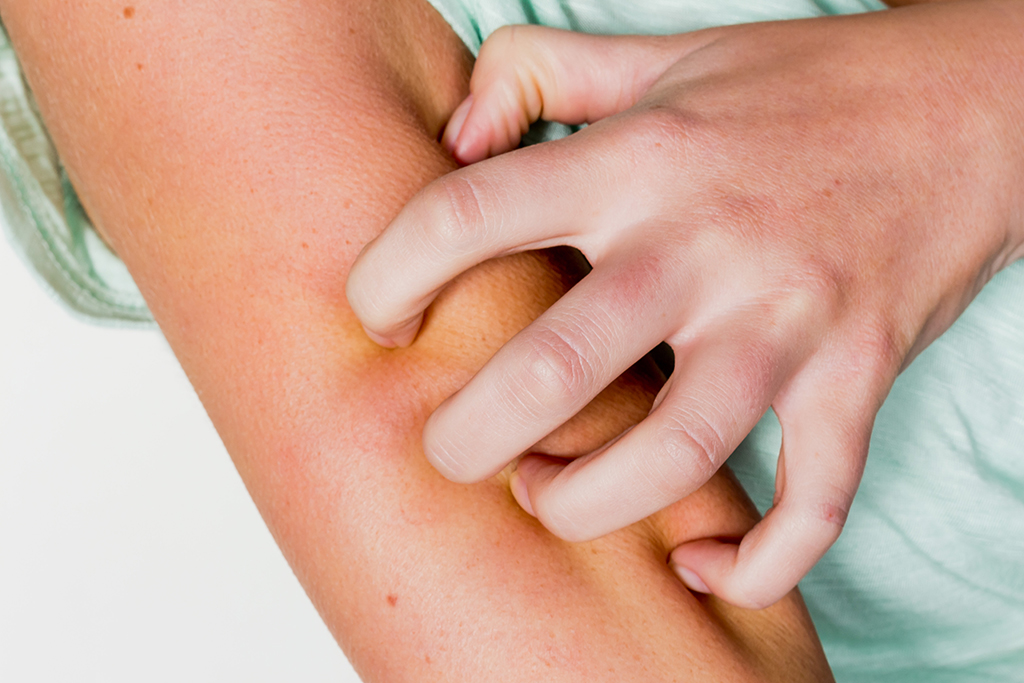
Photo by Lisa-S at Shutterstock
Itchy skin is a common problem that happens to everyone. The uncomfortable sensation to scratch, also known as pruritus, can distract you from everything until you give into it. When you do, the relief is often short-lived and leads to other problems, such as pain, broken skin that’s unsightly, and possibly infection. A dermatology office in the Southlake area can determine the cause of your itchy skin and develop a treatment plan to stop the itching and help you get clear skin back.
Insect Bites
In the summer, the most common cause of itchy skin involves unpleasant interactions with nature involving bugs. Most of the time, you won’t even know you’ve encountered an insect until you notice the sensation to scratch. The urge can start almost immediately. Bites from mosquitos are typical, and these go away on their own quickly. You can mitigate the itching with topical hydrocortisone, which is a mild, anti-inflammatory that’s available over-the-counter. The cream can reduce swelling and itchy quickly. Other at-home remedies include dabbing with rubbing alcohol and applying a cold compress.
It might sound counteractive, but a dermatology expert would tell you to try not to scratch the bite. Outside of possibly developing an infection, you may experience a secondary reaction to the bite. A mild reaction to the insect sting can include,
- Pain
- Physical rash (raised skin, pimple-like spots)
- Mild to moderate swelling in the bite’s area
- The section around the bite is warmer than the rest of your skin
- Excessive itching
Severe reactions are serious. Experiencing trouble breathing, a rapid pulse, swelling of the face, throat, or tongue requires immediate medical attention.
In addition to an allergic reaction, if the itching doesn’t stop or you see pus oozing from the bite, an infection might be present. Contact a dermatology office for the next available appointment if either of these situations occurs. To reduce future outbreaks, use insect repellant in the evening or when completing activities in the woods.
Reactions to Plant Life
Irritation doesn’t always come from insects in nature. Instead, you can experience itching as a reaction to touching plants in the woods or even everyday items in your garden. While you automatically think about poison ivy and oak, there are more common plants that can also leave you itching uncontrollably from a quick touch. Some of the most typical include,
- Carrots
- Dill
- Bleeding heart flowers
- Black-Eyed Susan
- Bishop’s weed
- Dried baby’s breath
- English Ivy
- Hops
- Hyacinth
- Tulips
Also known as contact dermatitis, these reactions can also happen because of soaps, cosmetics, certain metals, and fragrances. Along with itching, other signs of contact include a visible red rash, swelling, bumps, tenderness, and dry, cracked, and scaly skin.
You can prevent future reactions in most situations. For example, when you go out to work in your garden, dress appropriately. Although it might be hot and you don’t want to cover up, you can skip exposure by wearing gloves, long sleeves, pants, and closed-toe shoes.
If you think you’re experiencing symptoms from contact dermatitis and traditional home treatments aren’t working, or you develop a secondary infection, it’s time to contact a dermatology office in the Southlake area. The dermatologist may help you narrow down the cause of the itching to stop it and assist you with avoiding future contact and outbreaks.
Dry Skin
It may not be as glamorous as a bug bite, but dry skin is itchy and can be unsightly, leading to embarrassment in public when exposed. Many situations can cause dry skin and a dermatology professional can help you figure that out. Many people experience it during the winter months from dry heat that reduces the moisture in your skin. It needs hydration to maintain a smooth texture and elasticity to prevent wrinkles, sagging, flaking, and keep it looking great. Other situations that can cause dry skin include aging, medications, excess water exposure, soaps, and even pregnancy.
Most of these are easy to correct without medical intervention. As you age, your body losses oil glands, requiring you to moisturize more to maintain adequate hydration levels. Additionally, long-term exposure to sunlight reduces moisture, and older adults are more likely to take medications that can dry out the skin, leading to itching. You can control these factors by applying moisturizers more often, reducing excess water and UV light exposure, and choosing soaps and beauty products that don’t cause dry skin.
If these everyday solutions don’t help, schedule the next available appointment at your dermatology office in the area. A dermatologist can determine if there’s an underlying condition causing the dryness. They can also prescribe topical applications to better seal in moisturizer and anti-itch creams to provide much-needed relief. Patients that develop a secondary reaction or infection from itching may need additional care, including antibiotics. To prevent dry skin, apply moisturizer daily.
Swimmer’s Itch
Have you recently spent time in fresh or saltwater, such as the ocean or a lake? Your itchy skin may be a direct reaction to marine life exposure. Although you may not want to think about it, the refreshing water you took a swim in is also home to animals and parasites that live just below the surface. These can cause itching by burrowing into your skin or getting trapped between your skin and swimsuit in the water.
Most of the time, swimmer’s itch will clear on its own in a few days to a week with home care. Outbreaks that continue to happen after swimming in the same spot indicate a problem with the water. To prevent itching from parasites in the water, rinse with fresh water after you get out and change out of your swimsuit immediately after swimming. If you experience intense itches, red blotches, or welts that won’t go away with standard treatment, contact your dermatology office in the area.
Itchy skin can ruin your day. Don’t just lather on topical anti-itch creams or pop antihistamines to stop the itching. Get to the root of the problem with a dermatology expert that can examine your skin, diagnose the condition, and determine the best course of action to treat it. For the next available appointment, contact Compassion Dermatology in the area at 817-380-5911 today.


